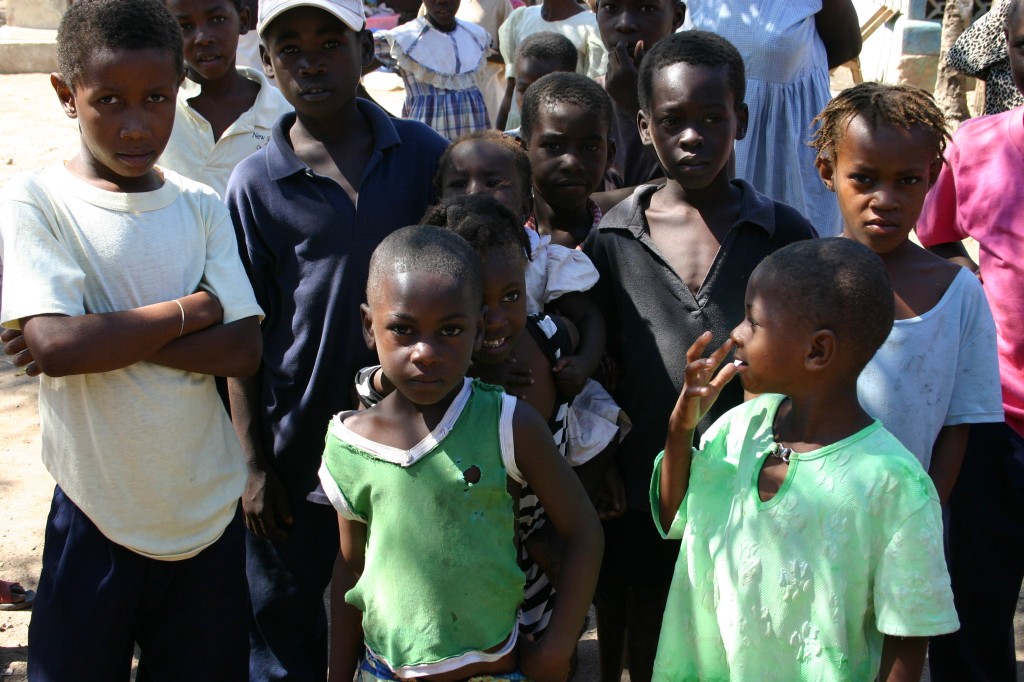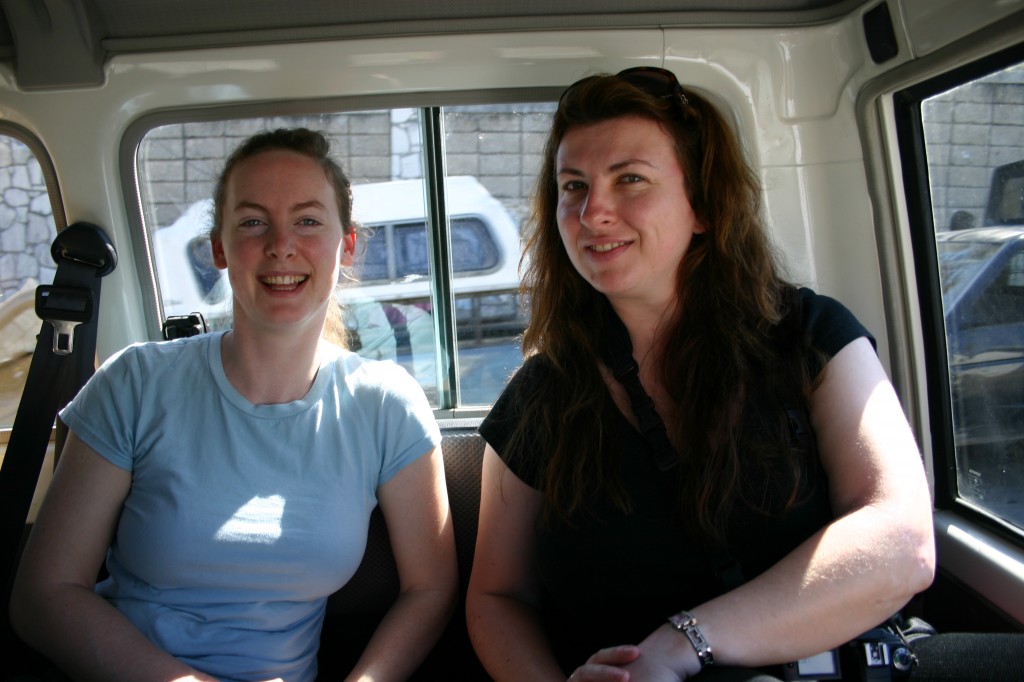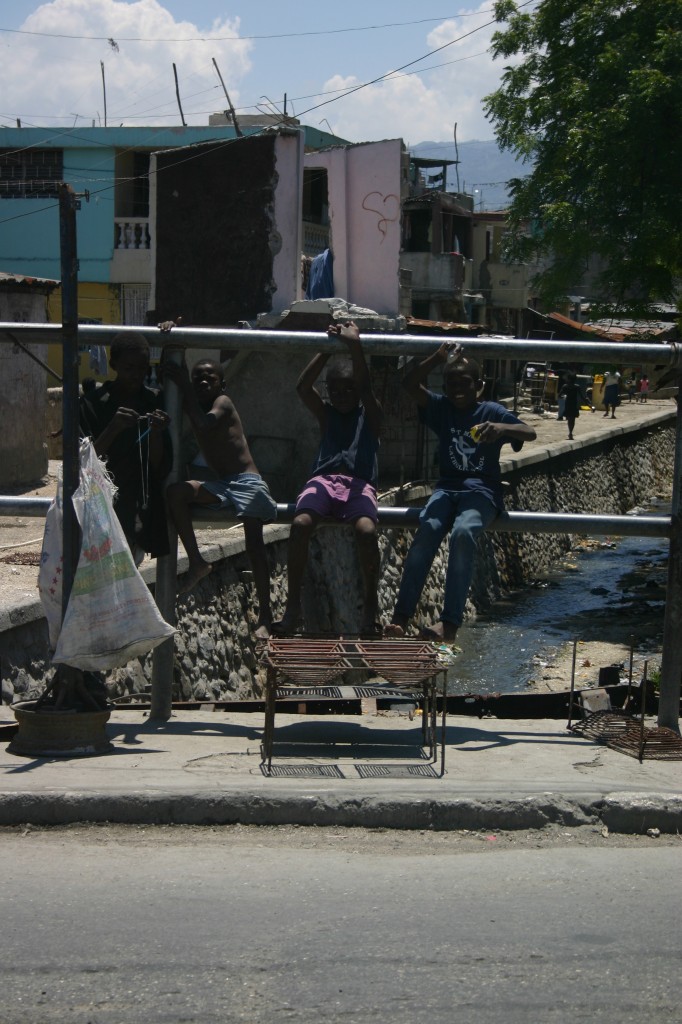This is an essay I wrote in 2006, after a trip to Haiti while working for Concern Worldwide. I recently came across it while digging up material for our upcoming trip there.
Haiti
I am on the Long Island Railroad, traveling through Queens, New York. On the side of a large gray building, I see these words printed, enigmatically: “Is it nothing to you, all you who pass by?” It has been less than 24 hours since I left Haiti, where I traveled for my job with Concern Worldwide to view our programs there in humanitarian relief. The words seem to be directed to me, the one who can move freely between worlds with such amazing speed
For I’ve done just that — passed by. Passed by misery and deprivation, past clusters of life and humanity I would not think could survive, like weeds pushing through the cracks of a sidewalk toward sunlight. Passed by in a whirlwind 72 hours, by train, plane, boat, four wheel drive. And I feel very much at the nexus, where one culture meets another, where rich meets poor, where gorgeous aquamarine waters meet crumbling concrete and open sewers, where human meets nature in a sometimes losing battle to reap survival out of the dust.
As for the answer to the question – no, it is not nothing to me. In fact, it has affected me profoundly, unexpectedly, even, since I’ve traveled before – but I suppose I had forgotten.

For humans rely on an entire universe of support to keep them alive. This was what I was continually reminded of in Haiti. An oft-heard religious phrase was mentioned by someone on the trip: “There but for the grace of God go I.†Each individual is stationed atop an endless network of linked hands, without which we fall prey to the unpredictable whims of nature. One day, food comes through the cracked, dry earth, and grows, and we are fed and we are happy. Another day, the rain has not fallen and the earth finally stops producing its green nurturance, and we are starved. Every day is a trust fall: you know, the old exercise often practiced at ropes courses and summer camps, where a group of fellow campers links hands and forms a net, and you stand atop a platform near their heads, and fall straight backwards. The jarring rush of fear that comes right as you lean back and cross the point of no return, right as you know – for certain – that your physical well-being rests with these people – friends, enemies, strangers – to catch you before you hit the ground. Will they be there? Never quite sure, you must summon every ounce of trust, blind trust and pure courage.
It must be this trust that keeps the Haitian people going, I think. But in fact, who are they trusting? Who can possibly be there to catch the fallout of humanity, in a place where every man and woman must daily confront the basic questions of survival: where will my family’s next meal come from? Where will our water come from? Where will I throw my trash, where will I go to the toilet? Of course, after years of living with these questions, there are a few answers: I will perhaps sell a few ounces of charcoal that I make by cutting down the few trees that remain. My daughter will walk for an hour, or two or three, to fetch a few liters of water for the whole family. I will eat mangos off the tree and perhaps not much else all day. The trash goes into the stinking ditch inches from my house, and the latrine is up the street and shared with all the families of the neighborhood; otherwise the canal is another option. Where are the hands of the receivers, the linked hands of humanity waiting to catch me? I fear I have already fallen too far.

I did not expect to find that the Concern staff – mostly Haitian, with one American, a Belgian, some Irish – are the very ropes of the safety net itself for so many Haitians. I am not sure what I expected. Perhaps a health clinic here, a well there. I did not realize the scope of the projects undertaken on the island. I was impressed by the linkages with the local partners, regular folk living in these communities, who have stepped forward and decided to group together and try to solve some of these problems. Who have chosen, of their own accord, to be the safety net for others, to lift up their fellow humans on their own shoulders. In Haiti, it is quite clear where these relationships exist, and how.
Father Aengus Finucane, who traveled with me and who founded Concern in 1968, said during the trip that one of the first things he learned while studying political science is that “Man is a political animal. Anywhere, he will organize.†I understood what he meant while talking to some residents of the tiny island of La Gonave, which last year suffered through 7 months of drought. These residents had proudly joined together with Concern representatives and the island’s mayor to build and manage several water cisterns and wells. One man had spent several days traveling, often on foot and without a road in sight, throughout the island to ask where and how people were collecting water. He said that they often walk down the mountain, with a donkey if they are lucky, load up some buckets and walk back. The whole process can take the better part of a day, and the task usually falls to one of the women or girls of the family.
With Concern providing things like building materials and payment for workers, along with a full time water coordinator, the water committee had built a few concrete cisterns to hold rainwater, helping some residents cut back on their water trekking time. Concern had also advised them about the benefits of using a chlorine solution to kill off bacteria. But if a community does not link hands like this and provide a net, such structures will fall into disrepair, the message about the chlorine treatment won’t stick, and the next thing you know the process has to be started up all over again. It is this type of building, rather than the physical building, which is crucial. Concern’s staff in Haiti are very aware of this, and months of careful relationship-building went into the cistern project until everyone involved was personally invested in its success. It is a delicate, often frustrating process of consensus building, of trust-building. The nuts and bolts of linking together – you have some of this, I have some of that, and together we can make something happen.

Having just seen this basic level of development in its slow, confounding, messy, but ever hopeful process, it has become so clear to me the extent to which we Americans stand on millions, billions of shoulders. We are not here by accident. We have climbed here. Having seen them all my life, skyscrapers suddenly surprise me; Manhattan – who built it? How did it come to pass that these sturdy buildings cropped up here, instead of the crumbling “architecture of poverty†(as one of my fellow travelers called it) in Haiti and other developing countries? Of course, it was the hands of millions – providing the money, the manpower, the materials, the plans, the land – that made it possible to hoist them so high.
I arrive on Long Island, where I’m visiting relatives. My cousin and his wife are there with their toddler. Five adults are caring for the child, who has four highchairs (one for each grandparent and her own house) and countless shiny new toys. She is beautiful, innocent. I do not begrudge her the care, love, and small baby luxuries that any parent would likely give her child if she was able. But I can’t help but imagine how many layers of hands, holding together, form the thick net of safety which holds this child firmly. Invisible fingers, which by chance entwined to lift this young baby up to cloud height, where she may freely wander, and see out over the horizon. While many a Haitian baby plays in the dirt between two tall, cinderblock walls, a sliver of sky barely visible above. I write this because I am amazed, not because I am angry. I am amazed that we do not see life. We do not see the generations of luck, hard work, failure and success that culminate in each of our very existence.
I am paging through an album at my uncle’s house, which he recently made from artifacts that were discovered in my grandmother’s apartment when she passed away. They are old, old photographs, my grandma’s grandma, articles about the life of my great-grandfather, birth certificates, records of generations past. It is all right there, the legacy that has come to result in these walls around me, to produce the toddler who can want for nothing. That have culminated in my own life. And I do not know how I can explain what I have seen, how I have passed by and how it’s not nothing to me, how I know I cannot just be a passerby. My relatives ask me, How was Haiti? I say that it was amazing, intense, difficult, interesting, beautiful. The conversation moves on – local business deals, plans for the day.
I suppose that all I want to ask is that you see the hands of millions that have graciously sculpted your life of opportunity. And that you not feel guilty, although some of the hands have been shackled, and some have bled, and most have suffered. I only ask that you see them, and are grateful for your life, and give freely from that which has been given to you. And at times when you are asked for a drink of water, you jump at the chance to say thank you to this person, your patron. Your safety net. Your great-great-grandmother.